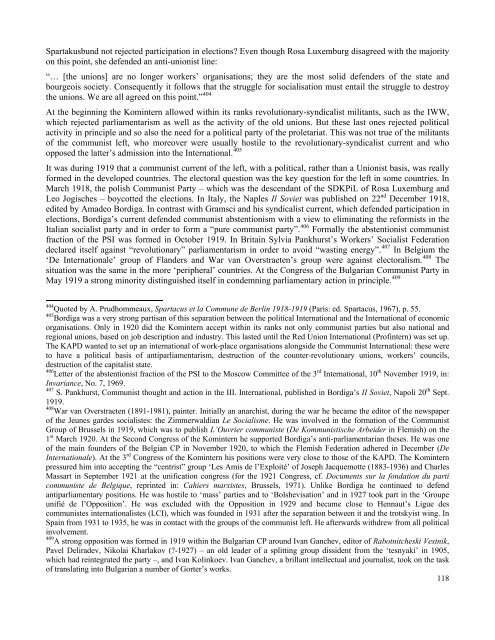The German-Dutch Communist Left - Libcom
The German-Dutch Communist Left - Libcom
The German-Dutch Communist Left - Libcom
Create successful ePaper yourself
Turn your PDF publications into a flip-book with our unique Google optimized e-Paper software.
Spartakusbund not rejected participation in elections? Even though Rosa Luxemburg disagreed with the majority<br />
on this point, she defended an anti-unionist line:<br />
“… [the unions] are no longer workers’ organisations; they are the most solid defenders of the state and<br />
bourgeois society. Consequently it follows that the struggle for socialisation must entail the struggle to destroy<br />
the unions. We are all agreed on this point.” 404<br />
At the beginning the Komintern allowed within its ranks revolutionary-syndicalist militants, such as the IWW,<br />
which rejected parliamentarism as well as the activity of the old unions. But these last ones rejected political<br />
activity in principle and so also the need for a political party of the proletariat. This was not true of the militants<br />
of the communist left, who moreover were usually hostile to the revolutionary-syndicalist current and who<br />
opposed the latter’s admission into the International. 405<br />
It was during 1919 that a communist current of the left, with a political, rather than a Unionist basis, was really<br />
formed in the developed countries. <strong>The</strong> electoral question was the key question for the left in some countries. In<br />
March 1918, the polish <strong>Communist</strong> Party – which was the descendant of the SDKPiL of Rosa Luxemburg and<br />
Leo Jogisches – boycotted the elections. In Italy, the Naples Il Soviet was published on 22 nd December 1918,<br />
edited by Amadeo Bordiga. In contrast with Gramsci and his syndicalist current, which defended participation in<br />
elections, Bordiga’s current defended communist abstentionism with a view to eliminating the reformists in the<br />
Italian socialist party and in order to form a “pure communist party”. 406 Formally the abstentionist communist<br />
fraction of the PSI was formed in October 1919. In Britain Sylvia Pankhurst’s Workers’ Socialist Federation<br />
declared itself against “revolutionary” parliamentarism in order to avoid “wasting energy”. 407 In Belgium the<br />
‘De Internationale’ group of Flanders and War van Overstraeten’s group were against electoralism. 408 <strong>The</strong><br />
situation was the same in the more ‘peripheral’ countries. At the Congress of the Bulgarian <strong>Communist</strong> Party in<br />
May 1919 a strong minority distinguished itself in condemning parliamentary action in principle. 409<br />
404 Quoted by A. Prudhommeaux, Spartacus et la Commune de Berlin 1918-1919 (Paris: ed. Spartacus, 1967), p. 55.<br />
405 Bordiga was a very strong partisan of this separation between the political International and the International of economic<br />
organisations. Only in 1920 did the Komintern accept within its ranks not only communist parties but also national and<br />
regional unions, based on job description and industry. This lasted until the Red Union International (Profintern) was set up.<br />
<strong>The</strong> KAPD wanted to set up an international of work-place organisations alongside the <strong>Communist</strong> International: these were<br />
to have a political basis of antiparliamentarism, destruction of the counter-revolutionary unions, workers’ councils,<br />
destruction of the capitalist state.<br />
406 Letter of the abstentionist fraction of the PSI to the Moscow Committee of the 3 rd International, 10 th November 1919, in:<br />
Invariance, No. 7, 1969.<br />
407 S. Pankhurst, <strong>Communist</strong> thought and action in the III. International, published in Bordiga’s II Soviet, Napoli 20 th Sept.<br />
1919.<br />
408 War van Overstraeten (1891-1981), painter. Initially an anarchist, during the war he became the editor of the newspaper<br />
of the Jeunes gardes socialistes: the Zimmerwaldian Le Socialisme. He was involved in the formation of the <strong>Communist</strong><br />
Group of Brussels in 1919, which was to publish L’Ouvrier communiste (De Kommunistische Arbeider in Flemish) on the<br />
1 st March 1920. At the Second Congress of the Komintern he supported Bordiga’s anti-parliamentarian theses. He was one<br />
of the main founders of the Belgian CP in November 1920, to which the Flemish Federation adhered in December (De<br />
Internationale). At the 3 rd Congress of the Komintern his positions were very close to those of the KAPD. <strong>The</strong> Komintern<br />
pressured him into accepting the “centrist” group ‘Les Amis de l’Exploité’ of Joseph Jacquemotte (1883-1936) and Charles<br />
Massart in September 1921 at the unification congress (for the 1921 Congress, cf. Documents sur la fondation du parti<br />
communiste de Belgique, reprinted in: Cahiers marxistes, Brussels, 1971). Unlike Bordiga he continued to defend<br />
antiparliamentary positions. He was hostile to ‘mass’ parties and to ‘Bolshevisation’ and in 1927 took part in the ‘Groupe<br />
unifié de l’Opposition’. He was excluded with the Opposition in 1929 and became close to Hennaut’s Ligue des<br />
communistes internationalistes (LCI), which was founded in 1931 after the separation between it and the trotskyist wing. In<br />
Spain from 1931 to 1935, he was in contact with the groups of the communist left. He afterwards withdrew from all political<br />
involvement.<br />
409 A strong opposition was formed in 1919 within the Bulgarian CP around Ivan Ganchev, editor of Rabotnitcheski Vestnik,<br />
Pavel Deliradev, Nikolai Kharlakov (?-1927) – an old leader of a splitting group dissident from the ‘tesnyaki’ in 1905,<br />
which had reintegrated the party –, and Ivan Kolinkoev. Ivan Ganchev, a brillant intellectual and journalist, took on the task<br />
of translating into Bulgarian a number of Gorter’s works.<br />
118
















